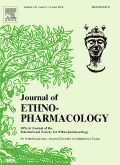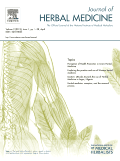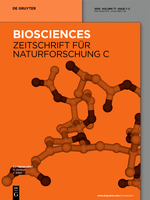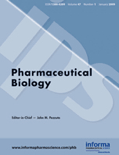
JOURNAL OF ETHNOPHARMACOLOGY
Scope & Guideline
Unveiling the Therapeutic Potential of Nature
Introduction
Aims and Scopes
- Ethnopharmacology:
The journal emphasizes studies that explore the traditional uses of medicinal plants and their active compounds, aiming to validate and document the cultural significance and therapeutic potential of these botanicals. - Phytochemistry:
Research on the chemical composition of herbal medicines is a core focus. This includes the identification and characterization of bioactive compounds and their pharmacological activities. - Mechanistic Studies:
The journal publishes articles that investigate the mechanisms of action of herbal remedies, including their effects on various biological pathways, cellular processes, and disease models. - Clinical Applications:
Studies assessing the efficacy and safety of herbal medicines in clinical settings are highlighted, showcasing the translational aspect of ethnopharmacological research. - Toxicology and Safety Assessment:
Research that evaluates the safety profiles of herbal products, including toxicity studies and risk assessments, is crucial for ensuring the safe use of traditional medicines. - Multi-Omics Approaches:
The journal increasingly encourages the integration of transcriptomics, proteomics, and metabolomics to elucidate the complex interactions and therapeutic effects of herbal medicines.
Trending and Emerging
- Integrative Approaches:
Research that combines traditional knowledge with modern scientific methodologies, such as network pharmacology and systems biology, is increasingly prevalent. This trend emphasizes the need for comprehensive studies that validate traditional remedies through contemporary scientific frameworks. - Focus on Gut Microbiota:
Emerging studies are investigating the interactions between herbal medicines and gut microbiota, highlighting their roles in modulating health and disease, particularly in metabolic and gastrointestinal conditions. - Personalized Medicine and Herbal Formulations:
There is a growing interest in the development of personalized herbal formulations tailored to individual patient needs, reflecting a broader trend in medicine toward customization based on genetic, environmental, and lifestyle factors. - Sustainability and Conservation:
Research addressing the sustainable use of medicinal plants and the conservation of biodiversity is gaining momentum, reflecting global concerns over the preservation of traditional knowledge and natural resources. - Technological Innovations in Herbal Research:
The application of advanced technologies such as metabolomics, proteomics, and artificial intelligence to study herbal medicines is on the rise, leading to more precise insights into their therapeutic mechanisms and potential applications.
Declining or Waning
- Historical Ethnobotanical Studies:
There has been a noticeable decrease in papers focused solely on historical ethnobotanical practices without modern scientific validation, as the emphasis shifts towards more integrative studies combining traditional knowledge with contemporary methodologies. - Basic Pharmacological Studies:
Research that only explores basic pharmacological properties of herbal compounds without delving into mechanisms or clinical implications seems to be less prevalent, as the field moves toward more applied and translational research. - Single Component Focus:
The journal is moving away from studies that concentrate on single compounds, reflecting a broader interest in the synergistic effects of multi-component herbal formulations and their holistic approaches to treatment. - Geographically Limited Studies:
There has been a decline in studies focusing exclusively on medicinal plants from specific geographic regions, as the journal increasingly promotes comparative studies that encompass a wider range of ethnopharmacological practices.
Similar Journals

Journal of Herbal Medicine
Unveiling the Power of Nature through Rigorous ResearchThe Journal of Herbal Medicine, published by Elsevier GmbH in Germany, stands at the forefront of research in the dynamic and evolving field of complementary and alternative medicine. With an ISSN of 2210-8033 and an E-ISSN of 2210-8041, this journal has been contributing significant insights since its inception in 2011 and continues to be a vital resource through 2024. Recognized for its scholarly rigor, it holds a commendable Q2 ranking in the 2023 Scopus category for Complementary and Alternative Medicine, placing it in the upper echelons of its field with a rank of 32 out of 105 journals, marking it in the 70th percentile. The Journal of Herbal Medicine emphasizes the integration of traditional herbal therapies and modern scientific approaches, offering researchers, professionals, and students a platform for disseminating their findings and fostering an inclusive dialogue on natural medicine's role in healthcare. Although it is not an open-access publication, its commitment to high-quality research makes it an essential read for those wanting to explore the efficacy and application of herbal medicine in contemporary practice.

Avicenna Journal of Phytomedicine
Exploring the Therapeutic Treasures of PlantsAvicenna Journal of Phytomedicine, published by Mashhad University of Medical Sciences, is a premier Open Access journal dedicated to advancing the field of phytomedicine. Established in 2011, this journal aims to promote research on the therapeutic potentials of medicinal plants, integrating traditional knowledge with modern pharmacological insights. With an ISSN of 2228-7930 and an E-ISSN of 2228-7949, it has garnered significant attention in the research community, achieving a Q2 ranking in Complementary and Alternative Medicine and a Q3 ranking in Drug Discovery as of 2023. Its Scopus rankings affirm the journal's relevance, with the journal positioned at 37 out of 105 in its category, reflecting a 65th percentile. The Avicenna Journal of Phytomedicine serves as an invaluable resource for researchers, professionals, and students seeking to explore innovative botanical therapies, making it a notable platform for disseminating high-quality research in this burgeoning field.

ZEITSCHRIFT FUR NATURFORSCHUNG SECTION C-A JOURNAL OF BIOSCIENCES
Unveiling Innovations in the Life SciencesZEITSCHRIFT FUR NATURFORSCHUNG SECTION C - A JOURNAL OF BIOSCIENCES, published by Walter de Gruyter GmbH, stands as a significant contribution to the field of biochemistry, genetics, and molecular biology. With an ISSN of 0939-5075 and an E-ISSN of 1865-7125, this esteemed journal has been disseminating critical research since its inception in 1973 and will continue to do so through 2024. As a recognized leader in its category, the journal holds a Q3 rank in the comprehensive field of biochemistry, genetics, and molecular biology, placing it in the 57th percentile according to Scopus rankings. While it operates under a traditional subscription model, this publication serves as a vital repository of high-quality, peer-reviewed articles that illuminate new discoveries and ongoing innovations within biosciences. Researchers, professionals, and students alike will find valuable insights and cutting-edge research within its pages, making it an essential resource for anyone serious about advancing their understanding in this dynamic field.

PHYTOTHERAPY RESEARCH
Empowering Research in Plant-Based InterventionsPhytotherapy Research, a distinguished journal published by Wiley, stands at the forefront of the pharmacological literature, delivering essential insights into the therapeutic potential of plant-based interventions. With its ISSN 0951-418X and E-ISSN 1099-1573, the journal has firmly established itself since its inception in 1987, now converging into its 2024 volume. Notably positioned in the Q1 category of Pharmacology and ranked #22 out of 313 journals in the field, it boasts a remarkable 93rd percentile rating according to Scopus. While the journal adheres to subscription-based access, it remains a crucial repository of high-quality research findings that support the understanding and advancement of herbal medicines and phytotherapeutics. This journal serves as an invaluable resource for researchers, healthcare professionals, and students alike, fostering a deeper exploration of the synergistic relationship between nature and medicine and promoting evidence-based practices in the field.

PHARMACEUTICAL BIOLOGY
Fostering Groundbreaking Discoveries in Drug Development and BeyondPHARMACEUTICAL BIOLOGY, published by Taylor & Francis Ltd, is a prominent open-access journal that has been a cornerstone of research in the life sciences since its convergence in 1961. With a strong focus on Complementary and Alternative Medicine, Pharmaceutical Science, and Drug Discovery, this journal is dedicated to disseminating groundbreaking research that intersects pharmaceuticals and biology. Acknowledged for its rigorous peer-review process, it holds a prestigious Q1 ranking in Pharmaceutical Science and exemplifies the commitment to quality and impact in the field, boasting an impressive Scopus rank of #14/105 in the complementary and alternative medicine category. Researchers keen on advancing their knowledge in these fields will find PHARMACEUTICAL BIOLOGY an invaluable resource, offering accessibility since its shift to open access in 2017. This journal presents a platform for innovative studies that contribute to the evolving understanding of pharmaceutical applications and biological interactions, serving as an essential hub for researchers, professionals, and students alike.

Natural Product Communications
Empowering Discoveries in Pharmacology and WellnessNatural Product Communications is an esteemed open-access journal published by SAGE Publications Inc, dedicated to the exploration and dissemination of knowledge concerning natural products in diverse fields, including Complementary and Alternative Medicine, Drug Discovery, and Pharmacology. Since its inception in 2006 and continuing through its converged years until 2024, the journal has gained recognition with a robust focus on plant science and the medicinal properties of natural products. With a commendable impact factor reflected in its category quartiles (Q3 across key domains), Natural Product Communications serves as a vital resource for researchers and professionals who aim to further the understanding of the therapeutic potential of natural compounds. As an open-access journal since 2020, it ensures wide accessibility to its published research, thereby facilitating collaboration and innovation within the scientific community. This commitment to excellence makes Natural Product Communications a crucial platform for advancing research in the holistic and pharmacological sciences.

Chinese Journal of Integrative Medicine
Integrating Tradition with Innovation in MedicineThe Chinese Journal of Integrative Medicine, published by SPRINGER, serves as a pivotal platform for advancing the field of complementary and alternative medicine. Since its inception in 1995, this journal has been committed to disseminating high-quality research and innovative practices that integrate traditional Chinese medicine with modern medical science. With an impressive categorization in the 2023 metrics, ranking Q2 in Complementary and Alternative Medicine and Q3 in both Medicine (miscellaneous) and Pharmacology (medical), the journal highlights its recognition within the global academic landscape. Researchers and practitioners alike can benefit from its rigorous peer-reviewed articles, making significant contributions to the understanding and application of integrative health strategies. While it currently does not support open access, the journal remains a key resource for those dedicated to exploring the synergy between ancient practices and contemporary medical approaches, thus enhancing patient care and outcomes.

Annals of Phytomedicine-An International Journal
Unlocking Nature's Secrets for Modern HealingAnnals of Phytomedicine - An International Journal is a leading publication dedicated to the exploration and advancement of phytomedicine, broadly encompassing research on medicinal plants, their bioactive compounds, and therapeutic applications. Published by UKAAZ Publications, this journal seeks to bridge the gap between traditional and modern medicinal practices, offering a platform for researchers, professionals, and students passionate about herbal therapies and their efficacy. With an ISSN 2393-9885 and E-ISSN 2278-9839, the journal adheres to stringent peer-review protocols to ensure the publication of high-quality research. Fostering open access to knowledge in a rapidly evolving field, Annals of Phytomedicine serves as an essential resource, promoting innovative findings and comprehensive reviews that drive the global discourse on phytotherapy. By engaging with this journal, readers can stay informed about the latest advancements, contributing significantly to the scholarly community and beyond.

Advances in Traditional Medicine
Advancing Knowledge in Complementary MedicineAdvances in Traditional Medicine, published by SPRINGER, stands at the forefront of the Complementary and Alternative Medicine field, dedicated to exploring the intricate landscapes of traditional medical practices worldwide. With an impressive 2023 Q2 ranking and a Scopus rank of #30/105, this journal is committed to advancing scholarly discourse and innovation in the study and practice of traditional medicine, making it an essential resource for researchers, practitioners, and students alike. As an Open Access journal, it ensures wide accessibility to cutting-edge research and developments from 2020 to 2024, fostering collaboration and knowledge exchange in the global medical community. Based in Singapore, with operations linked to VAN GODEWIJCKSTRAAT 30, 3311 GZ Dordrecht, Netherlands, this journal not only enhances its reach but also enriches the academic landscape with its significant contributions to understanding the role of traditional medicine in contemporary healthcare.

Jundishapur Journal of Natural Pharmaceutical Products
Elevating Knowledge in Natural Pharmaceutical InnovationsJundishapur Journal of Natural Pharmaceutical Products, published by BRIEFLAND in the Netherlands, serves as a pivotal platform for researchers and professionals in the realm of pharmacology and toxicology. With its ISSN 1735-7780 and E-ISSN 2228-7876, the journal has established itself since its inception in 2011, showcasing a commitment to advancing knowledge in natural pharmaceutical products through innovative research. In 2023, it earned a commendable ranking in the Q3 category for Pharmacology, Toxicology, and Pharmaceutics, reflecting its contribution to the field as evidenced by its position in the Scopus rankings. The journal aims to publish high-quality research articles, reviews, and case studies that explore the potential benefits and toxicological aspects of natural products. Although it currently does not offer open access, its rigorous peer-review process ensures that only impactful studies are disseminated, ultimately facilitating a deeper understanding of natural pharmaceutical innovations. For those engaged in this exciting and evolving field, Jundishapur Journal of Natural Pharmaceutical Products is an essential resource that not only expands scholarly discourse but also promotes safe practices in natural product utilization.